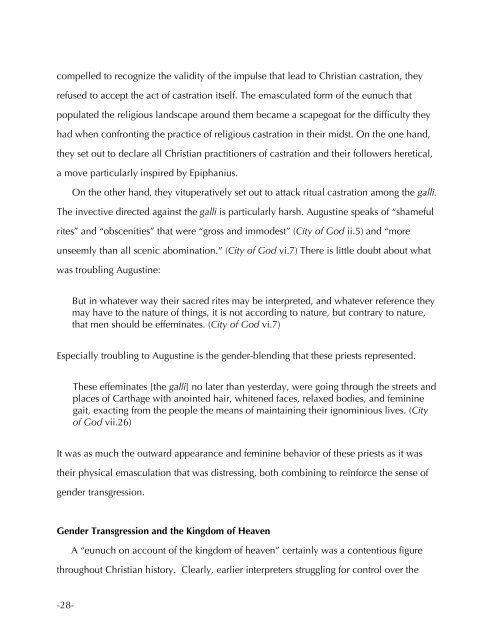-1- Eunuchs and the Postgender Jesus: Matthew 19:12 and ...
-1- Eunuchs and the Postgender Jesus: Matthew 19:12 and ...
-1- Eunuchs and the Postgender Jesus: Matthew 19:12 and ...
Create successful ePaper yourself
Turn your PDF publications into a flip-book with our unique Google optimized e-Paper software.
compelled to recognize <strong>the</strong> validity of <strong>the</strong> impulse that lead to Christian castration, <strong>the</strong>y<br />
refused to accept <strong>the</strong> act of castration itself. The emasculated form of <strong>the</strong> eunuch that<br />
populated <strong>the</strong> religious l<strong>and</strong>scape around <strong>the</strong>m became a scapegoat for <strong>the</strong> difficulty <strong>the</strong>y<br />
had when confronting <strong>the</strong> practice of religious castration in <strong>the</strong>ir midst. On <strong>the</strong> one h<strong>and</strong>,<br />
<strong>the</strong>y set out to declare all Christian practitioners of castration <strong>and</strong> <strong>the</strong>ir followers heretical,<br />
a move particularly inspired by Epiphanius.<br />
-28-<br />
On <strong>the</strong> o<strong>the</strong>r h<strong>and</strong>, <strong>the</strong>y vituperatively set out to attack ritual castration among <strong>the</strong> galli.<br />
The invective directed against <strong>the</strong> galli is particularly harsh. Augustine speaks of “shameful<br />
rites” <strong>and</strong> “obscenities” that were “gross <strong>and</strong> immodest” (City of God ii.5) <strong>and</strong> “more<br />
unseemly than all scenic abomination.” (City of God vi.7) There is little doubt about what<br />
was troubling Augustine:<br />
But in whatever way <strong>the</strong>ir sacred rites may be interpreted, <strong>and</strong> whatever reference <strong>the</strong>y<br />
may have to <strong>the</strong> nature of things, it is not according to nature, but contrary to nature,<br />
that men should be effeminates. (City of God vi.7)<br />
Especially troubling to Augustine is <strong>the</strong> gender-blending that <strong>the</strong>se priests represented.<br />
These effeminates [<strong>the</strong> galli] no later than yesterday, were going through <strong>the</strong> streets <strong>and</strong><br />
places of Carthage with anointed hair, whitened faces, relaxed bodies, <strong>and</strong> feminine<br />
gait, exacting from <strong>the</strong> people <strong>the</strong> means of maintaining <strong>the</strong>ir ignominious lives. (City<br />
of God vii.26)<br />
It was as much <strong>the</strong> outward appearance <strong>and</strong> feminine behavior of <strong>the</strong>se priests as it was<br />
<strong>the</strong>ir physical emasculation that was distressing, both combining to reinforce <strong>the</strong> sense of<br />
gender transgression.<br />
Gender Transgression <strong>and</strong> <strong>the</strong> Kingdom of Heaven<br />
A “eunuch on account of <strong>the</strong> kingdom of heaven” certainly was a contentious figure<br />
throughout Christian history. Clearly, earlier interpreters struggling for control over <strong>the</strong>


